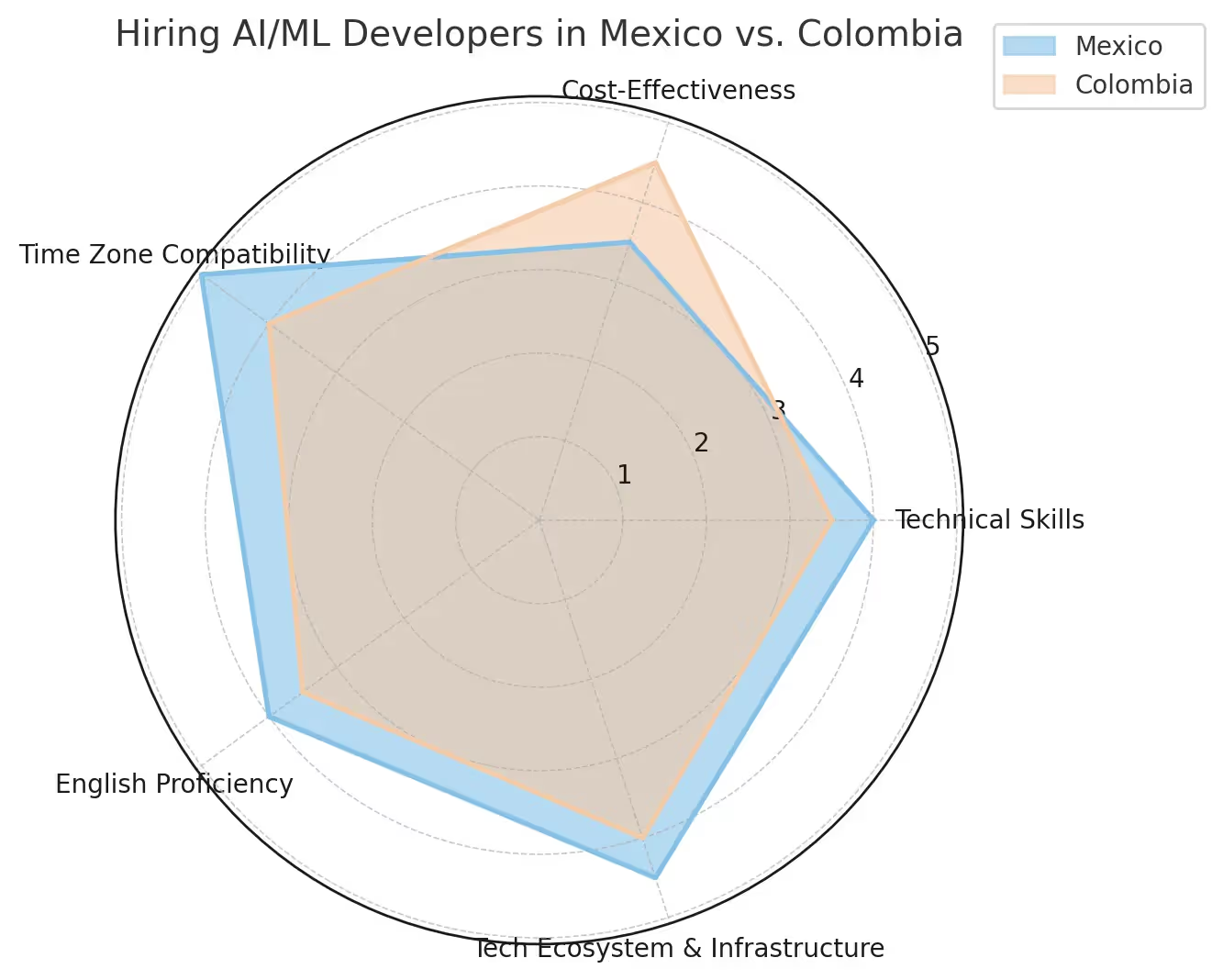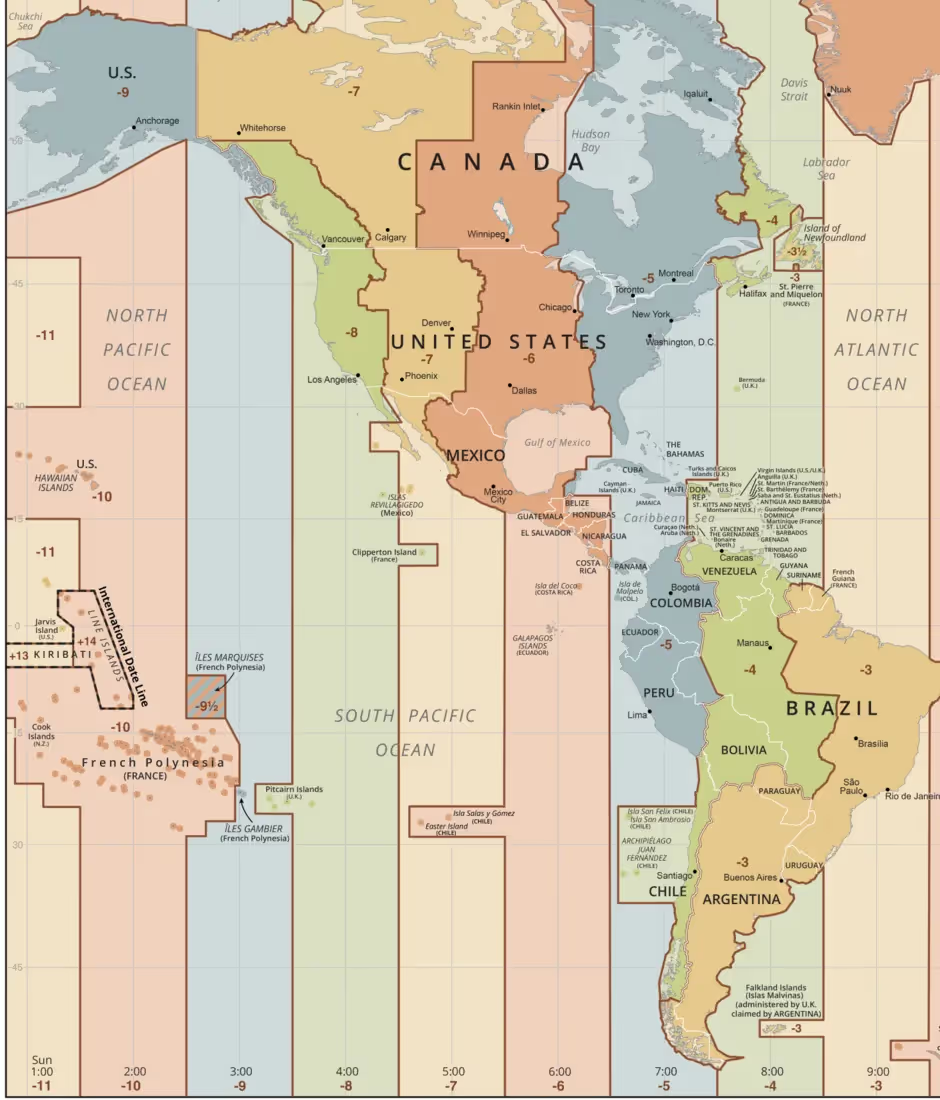If you're a hiring manager, decision maker, or recruiter at a technology company in the U.S. or Canada, finding the right development partner can be overwhelming. With countless buzzwords, different models, and an endless list of options, it’s easy to feel lost.
But don’t worry – we’ve got you covered. In this article, we’ll explore nearshore software development outsourcing and compare two popular options: Mexico and Colombia. Whether you're scaling a startup or managing an enterprise team, we'll help you navigate the options and hire AI/ML developers that fit your needs.
What to Expect When You Hire AI/ML Developers
AI/ML developers are at the forefront of driving innovation across various sectors like healthcare, finance, retail, and entertainment. By hiring skilled AI/ML developers, businesses can leverage data, automate processes, and make smarter, data-driven decisions.
AI/ML technologies are transforming industries in significant ways. For example, chatbots and virtual assistants streamline customer support, while fraud detection systems reduce financial fraud by analyzing transaction data. In marketing, personalized campaigns deliver targeted ads based on consumer behavior. In healthcare, AI systems assist in diagnosing diseases, predicting outcomes, and optimizing treatment plans.
To hire AI/ML developers, it's important to seek professionals with strong technical skills, such as proficiency in programming languages like Python, R, or Java, and expertise in frameworks such as TensorFlow, PyTorch, or Scikit-learn. Familiarity with big data technologies like Hadoop and Spark is also highly valuable. Along with technical abilities, soft skills—such as strong communication, adaptability, and problem-solving—are crucial to ensure effective collaboration, especially in remote teams.
Learn more about hiring top AI/ML software engineers in Latin America.

Mexico vs Colombia: Talent Pool Comparison
Both Mexico and Colombia boast skilled talent pools of AI/ML developers. However, they differ in terms of specialization, educational systems, and market dynamics.
Mexico
Mexico's proximity to the U.S. makes it an ideal location for businesses looking for AI/ML developers who can easily align with North American time zones. The country’s top-tier universities foster a rich talent pool, producing highly skilled developers with expertise in industries like manufacturing, healthcare, and retail.
Strengths:
- Proximity to the U.S.
- Strong emphasis on engineering education with top universities like UNAM and Tec de Monterrey.
- Developers often specialize in applied AI, particularly for industries like manufacturing and healthcare.
Drawbacks:
- Slightly higher competition for top talent, particularly in urban hubs like Mexico City or Guadalajara.
Colombia
Colombia’s growing tech scene, particularly in cities like Medellín and Bogotá, has attracted significant investment, making it a hotspot for AI/ML talent. The focus on data engineering and AI research, along with collaborations with global tech companies, gives Colombian developers an edge in cutting-edge projects.
Strengths:
- Rapidly growing tech ecosystem, especially in Medellín and Bogotá.
- Focus on data engineering and AI research, driven by partnerships with international tech firms.
- Competitive rates compared to Mexico.
Drawbacks:
- Infrastructure can be uneven in smaller cities.
Cost Analysis: Hire AI/ML Developers in Mexico vs Colombia
Cost is often one of the most decisive factors when choosing where to hire remote talent, especially when you look to hire AI/ML developers. Both Mexico and Colombia offer competitive rates compared to the U.S. or Canada, but there are noticeable differences depending on the skill level, experience, and location of the developers.
Monthly salaries for AI/ML developers in Mexico fall within the following ranges:
- Junior developers: Around $6,000
- Mid-level developers: Approximately $8,500
- Senior developers or specialists: Up to $10,500
Monthly salaries in Colombia are as follows:
- Junior developers: Around $5,000
- Mid-level developers: Approximately $7,500
- Senior developers or specialists: Up to $9,500
To decide which is the best fit for your project, consider the complexity of your requirements, preferred time zone alignment, and budget constraints. Both options offer exceptional value compared to hiring in North America.
Learn more about hiring LATAM developers.
Time Zones and Work Overlap: Which Fits Your Business Hours?
One of the biggest advantages of nearshore outsourcing is the compatibility of time zones, which ensures seamless collaboration between teams, especially when you hire AI/ML developers. Both Mexico and Colombia provide favorable options for U.S. businesses, but their time zone differences can influence your decision.
Mexico spans several time zones, primarily Pacific Standard Time (PST) and Central Standard Time (CST), making it highly adaptable to U.S. business hours.
- Difference from the U.S.: Depending on the region, Mexico is between 1 and 3 hours behind major U.S. time zones. For instance, a developer in Mexico City (CST) is 1 hour behind New York (EST)..
- Work Hour Overlap: This range ensures nearly full overlap with U.S.-based teams, particularly beneficial for companies in California, Texas, or New York.
Colombia operates on Eastern Standard Time (EST) year-round, without observing daylight saving time.
- Difference from the U.S.: Colombia is in the same time zone as the U.S. East Coast (New York, Miami). However, it is 3 hours ahead of the West Coast (California).
- Work Hour Overlap: Perfect for East Coast businesses, as the schedules are identical. Reasonable overlap for West Coast teams, allowing for several shared working hours each day.
Which Time Zone is Better for You?
If your business operates on the West Coast, you might lean toward Mexico’s PST/CST developers for extended overlap, ensuring real-time communication throughout the day.
For East Coast teams, Colombia’s EST developers offer an equally convenient option, aligning seamlessly with your working hours.

Language and Communication Skills in Mexico and Colombia
Fluent English is a must when collaborating remotely. Both countries excel in this area:
- Mexico: English proficiency is strong, particularly in urban centers like Mexico City, Monterrey, and Guadalajara. Developers are typically comfortable leading meetings, presenting ideas, and communicating effectively with U.S.-based clients.
- Colombia: English skills are steadily improving, with cities like Medellín and Bogotá leading this trend. Developers often excel in written communication, such as clear technical documentation, but verbal fluency may vary and require case-by-case assessment.
Both countries excel in English proficiency, but Mexico has a slight edge in verbal fluency, especially for client-facing roles
Infrastructure and Tech Ecosystem: Best Places to Hire AI/ML Developers
Mexico and Colombia's tech ecosystems have unique strengths in supporting remote development teams, making them ideal places to hire AI/ML developers.
Mexico: With a mature tech ecosystem, it offers widespread high-speed internet, renowned hubs like Guadalajara ("Mexican Silicon Valley"), and government programs like ProSoft to encourage innovation. Its proximity to the U.S. and robust infrastructure make it ideal for reliable, large-scale operations, including AI/ML development.
Colombia: Known for its rapid growth, Medellín leads innovation as the “Silicon Valley of Latin America,” supported by programs like Ruta N. Cities like Bogotá and Cali are experiencing a startup surge, excelling in AI, fintech, and blockchain. While internet access in rural areas lags, urban hubs enjoy excellent connectivity, making it an attractive option to hire AI/ML developers
Mexico’s maturity and proximity suit established projects, while Colombia’s creativity and cost-effectiveness are perfect for cutting-edge solutions. Both countries offer strong options tailored to different priorities.
Find out more about hiring developers from Latin America.
FAQ
Can data engineering be outsourced?
Yes, data engineering can be outsourced to nearshore or offshore teams. Many companies in Latin America specialize in providing data engineering services for AI/ML projects.
Is there a demand for data engineers?
Absolutely. The rise of big data, AI, and IoT has fueled demand for data engineers worldwide, making them a critical asset for tech teams.
How do I hire a data engineer?
Define your project scope, assess candidates for technical and soft skills, and partner with a reliable outsourcing agency specializing in AI/ML talent.
Where can I find good data engineers?
Mexico and Colombia are excellent options for hiring skilled data engineers, thanks to their strong educational systems and growing tech industries.
Conclusion
Mexico and Colombia stand out as top destinations for hiring AI/ML developers for remote development teams. They offer unique advantages in infrastructure, tech ecosystems, and English proficiency.
Mexico’s mature tech hubs, strong internet connectivity, and cultural alignment with the U.S. make it ideal for reliable and large-scale projects, including AI/ML development. Colombia’s rapid innovation, particularly in Medellín’s growing tech scene, combined with cost-effectiveness and a rising English-speaking workforce, is perfect for cutting-edge and creative AI/ML solutions. Both countries provide robust options to hire AI/ML developers tailored to business priorities, ensuring seamless collaboration and success in remote operations.
To help you make the best decision, use the calculator below to estimate your costs and potential savings. For more details and personalized advice, please contact us.







